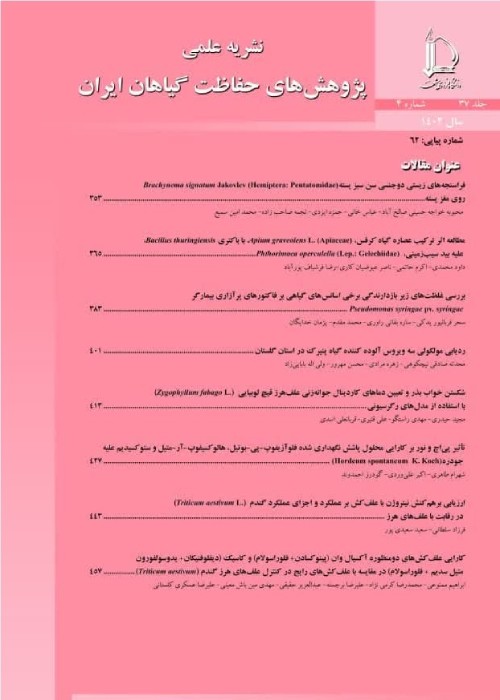Effect of Trichoderma harizianum Strain T22 on Induced Resistance of Tomato to Helicoverpa armigera Hübner
Beneficial soil microorganisms such as plant growth-promoting rhizobacteria (PGPR), mycorrhiza fungi, endophytic fungi and plant growth-promoting fungi can increase plant growth and their defense against some plant diseases and insect pests. Some species of Trichoderma spp. known as plant growth stimulants are found in many soils where crops are grown, especially around the rhizosphere. These species increase growth rate, nutrient uptake, plant efficiency and defense ability against herbivorous insects. In this regard, a very important approach is the use of microorganisms that enhance plant growth, which achieves optimal plant performance and reduces pest damage and environmental pollution.
In this study, the seeds of Falat cultivar were inoculated with spores of T. harizianum strainT22 (30 mg of 5 mg suspension of fungal spores were inoculated next to the plant), which they were cultivated under greenhouse conditions (25 ±5 °C, 55±5% RH 16: 8 h, L: D). First to fourth instar larvae of Helicoverpa armigera were placed on the leaf and fourth to sixth instar larvae were placed on the fruit of treated or untreated plants (as control). Then the relative growth rate of larvae, larval developmental time, percentage of larval mortality and total fecundity and fertility of adult female were recorded. Also, some growth and biochemical parameters of the experimental plants were measured.
The results showed that the larval developmental time and percentage of larval mortality were significantly higher than these parameters in insects raised on control plants and in contrast to, the relative larval growth rate and total fecundity and fertility of female insects in treated plants was significantly less than these indicators in insects fed to control plants. Amounts of some micro- and macro- elements, number of leaves, root volume, fruit weight per plant (yield), the amount activities of polyphenol oxidase and catalase enzymes as well as amounts of proline and hydrogen peroxide in plants treated with fungi were significantly more than these parameters on control plants. Stimulation of the plant's defense system by the use of this fungi, which has resulted in the production of more plant defense products, proline and hydrogen peroxide. This fungus stimulates the plants defense system in the direction of different metabolic pathways of different defense materials. Since the production of proline and hydrogen peroxide is the same in the metabolic pathway, the production of these two defense molecules in treated plants has increased significantly. Comparing the amounts of these two molecules in plants that have not been fed by larvae is also quite clear that the presence of this fungus has stimulated the plant's defense system. In plants fed on pest larvae, these values have increased significantly due to damage to the fruit tissue of the tomato plant. The production of proline and hydrogen peroxide are in the same metabolic pathway, the production of these two defense molecules in treated plants has increased significantly. Comparing the amounts of these two molecules in plants that have not been fed by the larvae of the pest is also quite clear that the presence of this fungus has stimulated the plant's defense system. In plants fed on pest larvae, these values have increased significantly due to damage to the fruit tissue of the tomato plant
This study is the first evidence that indicated positively affected by T. harizianum strain T22 on the strength of tomato plant response in both aspects of higher nutrient uptake and increase its vegetative and reproductive growth, as well as increasing the function of the plants defense system in response to feeding of fruits of tomato. From the results of this study, it is inferred that the use of biological product of T. harizianum T22 helped to absorb more nutrients to the plant and stimulated and strengthened the plant's defense system against the attack of tomato fruit worm. The results of this study show that the use of beneficial soil microorganisms to strengthen plant defenses in terms of crop protection is a promising strategy to control an important group of pests such as vegetarians to reduce the use of pesticides. Finally, the results of this study proved that inductive resistance can be used as an important tool for pest management to reduce the use of chemical insecticides.
- حق عضویت دریافتی صرف حمایت از نشریات عضو و نگهداری، تکمیل و توسعه مگیران میشود.
- پرداخت حق اشتراک و دانلود مقالات اجازه بازنشر آن در سایر رسانههای چاپی و دیجیتال را به کاربر نمیدهد.



